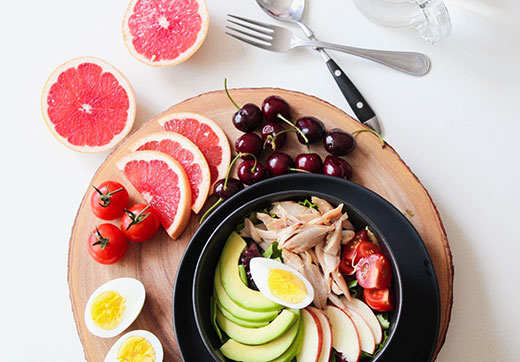
Some of the best foods that offer health benefits, including anti-inflammatory properties, are berries, fatty fish like salmon and tuna, tomatoes, nuts and broccoli.
Top 10 foods that fight inflammation
Nutritionist outlines foods with natural anti-inflammatory properties
April 15, 2021
NOTE:Over the next several weeks, K-State Research and Extension will release a series of articles covering foods with health-promoting properties … and some to avoid. This is the first in the series.
MANHATTAN, Kan. – Whether it’s an injury, arthritis or infection, our bodies often respond with inflammation, a sign that it’s working to ward off whatever it is that ails us.
But when inflammation becomes chronic, there are natural ways to help manage it through what we eat, according to a Kansas State University nutrition educator.
“A lot of foods have these healthful traits, but some foods do make every list,” said Sandy Procter, state nutrition specialist with K-State Research and Extension. Her top 10 list of foods with anti-inflammatory properties include:
- Berries, including blueberries, strawberries, raspberries and more.
- Salmon, tuna and other fatty fish (yes, sardines, too).
- Nuts, including walnuts and almonds.
- Olive oil, especially extra virgin olive oil.
- Peppers, including bell and chili peppers.
- Dark green, leafy vegetables such as spinach, kale, and collards.
- Green tea.
- Chocolate and cocoa.
Turmeric, cherries, fresh herbs and spices also are helpful.
So, does this mean those dark chocolate-covered almonds that tend to jump into our shopping carts are good for us?
“I’d say, definitely better than most candies,” Procter said, “and if that little bit of sweet replaces say, a handful of cookies or a piece of cake, then yes. Portion control then becomes the issue.”
Different components in foods have anti-inflammatory effects. They differ from food to food. Fruits and vegetables contain antioxidants, whole grains contain fiber and nuts and seeds have fiber and healthy oils.
“Because there are so many different substances that fight inflammation, a varied healthy diet is important,” Procter said. “That way, we introduce many diverse types of inflammation-fighting components into our bodies on a regular basis.”
When asked if these foods are more important as people age and develop conditions such as arthritis, Procter said: “These foods are excellent throughout life – if healthy food choices start early, then those healthy food habits will support good health as a person ages. Many chronic diseases, such as obesity and Type 2 diabetes, are related to chronic inflammation. We know those diseases are affecting more people at younger ages, so starting early is very important.”
But it’s never too late to improve our food choices and to eat healthier, she added. Most anti-inflammatory foods are also the ones that make up the Mediterranean eating pattern, which is mostly made up of fruits, vegetables, nuts, whole grains, fish and healthy oils. People who follow that diet from the earliest ages frequently live notably long and healthy lives.
Can people eat enough of these foods to make a difference?
“In a word, yes,” Procter said. “Research has shown it is the foods themselves in the overall diet, not supplements, that really bring about healthful benefits. That’s why we are consistently encouraged to eat more fruits and vegetables, choose whole grain foods and to vary our protein. Plus, if we focus on those anti-inflammatory foods, and avoid or limit the foods shown to cause inflammation, we are taking huge strides for health.”
Foods that cause inflammation and should be avoided or only eaten in moderation, include refined carbohydrates, such as white bread and pastries; French fries and other fried foods; soda and other sugar-sweetened beverages; red meat and processed meats including hot dogs, sausage; and margarine, shortening and lard, according to Harvard Health Publishing at Harvard Medical School (2020).
“It is no coincidence that most of the same foods to avoid for inflammation are generally considered bad for our health,” Procter said.
Procter herself said she’s always eaten fruits and vegetables and is discovering even more healthy foods: “I have learned to love salmon, and nuts, and more beans and whole grains than I ever knew existed. Avocadoes are a more recent preference. And – I have learned to appreciate dark, dark chocolate!”
“Even foods we don’t think are necessarily exciting – like black coffee, apples and mushrooms – are high in anti-inflammatory components,” she added.
More information about human nutrition is available on the K-State Extension Food, Nutrition, Dietetics and Health.

